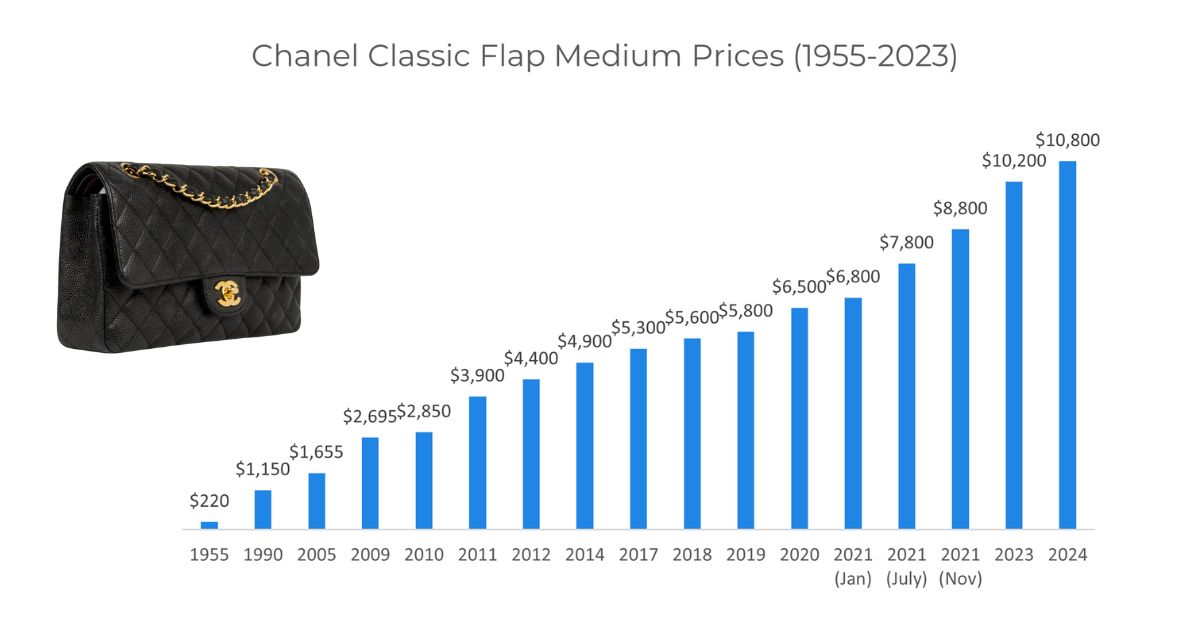Fine wine vs luxury handbags: the investment perspective
- Luxury handbags are the second most popular collectible item among UK wealth managers in 2024, after fine wine.
- Rising prices in the primary market for handbags have led to investment interest.
- While valuations for brands like Chanel and Hermès have spiked dramatically, the secondary market is less established and more illiquid than the fine wine market.
Recent headlines have been filled with news about skyrocketing prices for luxury handbags. The price of the Chanel medium classic flap bag has risen close to 553% since 2005; and 4,809% since 1955.
With prices in the primary market reaching record highs, interest in handbags as a collectible has grown. The term ‘investment piece’ no longer serves to simply describe the timelessness of an item; for investors today, it has taken a much more literal meaning.
Meanwhile, fine wine remains a more established member of the ‘collectibles’ family. In recent years, fine wine has transitioned from a passion investment to a mainstream asset class.
This article explores the shift in investment trends, the rising popularity of luxury assets, and the risks and rewards associated with fine wine and luxury handbags.
A shift in investment trends
Traditionally, investments have been confined to stocks, bonds, and real estate. Now, they are sharing the spotlight with more tactile assets like fine wine and luxury handbags.
According to our recent survey among US and UK wealth managers, there has been a significant uptick in interest for collectibles. In 2024, 78% of US wealth managers expect demand for luxury handbags to increase, complemented by a strong ongoing interest in fine wine (84%).
In the UK, 86% anticipate growth in demand for luxury handbags, up 6% from 2023, while 92% expect sustained demand for fine wine.
The full findings of this survey will be released later this month.
Comparing fine wine vs luxury handbags
Fine wine is sought after for its stability and remains the top investment choice among alternative assets. Its secondary market is more established, offering increased liquidity and price transparency.
It does not lack impressive performers either; luxury Champagnes Salon Le Mesnil-sur-Oger Grand Cru has appreciated 304% over a decade, and Egly-Ouriet Brut Millésime Grand Cru has seen returns of 452%. Prestigious Burgundy wine, Domaine René Engel Vosne-Romanée is up 3,105% over the same period.
Although luxury handbags are a newer investment avenue, they have shown considerable promise. The valuation of iconic pieces like the Hermès Birkin and Chanel Flap Bag has spiked dramatically, reflecting their growing appeal among investors who value both fashion and finance.

Celebrity endorsements
Celebrity endorsements have significantly influenced this market segment. For instance, the Louis Vuitton Pochette Accessoires bag retailed for $165 in 2001; today, it costs $1,520 – an increase of 821%. Over that period, celebrities like Paris Hilton, Nicole Richie, and even fictional character Carrie Bradshaw have boosted its value.
This phenomenon is less prevalent in the world of fine wine, though not entirely absent. Domaine Dujac, for instance, became a brand on the move (the highest riser in the 2018 Liv-ex Power 100 rankings) due to DJ Khaled’s endorsement in a music video.
Investor demographics
Another key distinction between these investment avenues lies in their typical investor demographics. According to the Financial Times, luxury handbags tend to attract younger female clients, who are drawn to both the fashion statement and the investment potential of these pieces. In contrast, the typical fine wine investor is often older and male, with a preference for the historical depth and long-term value appreciation that fine wines offer.
Risks and rewards
Investing in luxury handbags comes with its set of challenges. Unlike fine wine, which can be stored and aged with relative ease, handbags require meticulous care to maintain their condition and value.
Additionally, the market for luxury bags is more volatile, influenced heavily by trends and the limited number of high-value players like Hermès, Chanel, and Louis Vuitton. Future demand for specific models or brands can be unpredictable, and the resale market is often less liquid than that of fine wines.
Both fine wine and luxury handbags offer intriguing opportunities for portfolio diversification, each with unique benefits and challenges. The consistent performance and security of fine wine make it a reliable choice for those seeking steady growth. In contrast, luxury handbags can provide the pleasure of owning a piece of high fashion, though they carry higher risks.
As the luxury investment landscape continues to evolve, the blend of passion and profitability remains a compelling draw for high-net-worth investors globally.
WineCap’s independent market analysis showcases the value of portfolio diversification and the stability offered by investing in wine. Speak to one of our wine investment experts and start building your portfolio. Schedule your free consultation today.